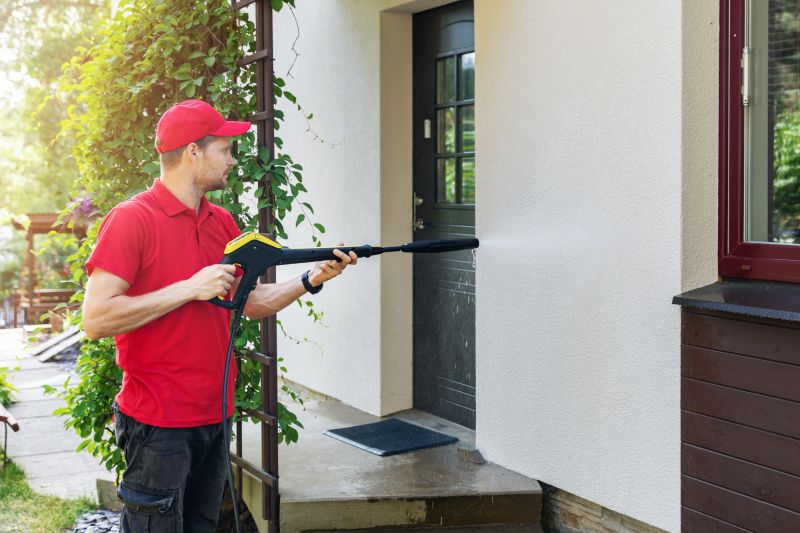Favorite Products for Siding Service Applications
Uncover the most trusted tools and materials that ensure successful siding repairs and upgrades.
 When considering products for siding service in Joplin, MO, it is important to focus on materials and tools that ensure durability, ease of installation, and long-term performance. Siding products come in a variety of types, each suited to different aesthetic preferences and functional needs. From traditional options like vinyl and wood to modern composite and fiber cement materials, homeowners and contractors have a broad selection to choose from. Proper selection of siding products can enhance the appearance of a property, provide insulation benefits, and protect against the elements.
When considering products for siding service in Joplin, MO, it is important to focus on materials and tools that ensure durability, ease of installation, and long-term performance. Siding products come in a variety of types, each suited to different aesthetic preferences and functional needs. From traditional options like vinyl and wood to modern composite and fiber cement materials, homeowners and contractors have a broad selection to choose from. Proper selection of siding products can enhance the appearance of a property, provide insulation benefits, and protect against the elements.
Top Overall Option
Fiber Cement Siding
Fiber cement siding is recognized for its durability, low maintenance requirements, and versatile appearance. It can mimic the look of wood, stucco, or masonry, offering a wide range of design options. Its resistance to pests, rot, and fire makes it a popular choice for long-term siding solutions in various climates, including those experienced in Joplin, MO.
Types of Products For Siding Service
Vinyl Siding
A popular and affordable option, vinyl siding offers a wide variety of colors and styles with minimal maintenance needs.
Wood Siding
Traditional wood siding provides natural beauty and can be customized through staining or painting, though it requires regular upkeep.
Composite Siding
Composite siding combines various materials to achieve durability and aesthetic flexibility, often mimicking natural materials.
Fiber Cement Siding
Known for its strength and resistance to elements, fiber cement siding is a versatile choice for many homeowners.
Metal Siding
Metal siding, including aluminum and steel, offers excellent durability and a modern appearance, suitable for various architectural styles.
Stucco
Stucco provides a textured finish that can be applied over various substrates, offering a classic look with good weather resistance.
Stone Veneer
Stone veneer adds a natural, upscale appearance to siding projects and can enhance curb appeal.
Brick Veneer
Brick veneer provides a traditional aesthetic with the benefit of lighter weight and easier installation compared to full brick.
Insulated Siding
Insulated siding includes a foam core that improves energy efficiency and adds an extra layer of protection.
Engineered Wood Siding
Engineered wood offers the look of natural wood with enhanced resistance to pests and moisture.
PVC Siding
PVC siding is lightweight, resistant to moisture, and easy to maintain, suitable for various styles.
Rubber Siding
Rubber siding offers flexibility and impact resistance, often used in commercial or specialty applications.
Popular Choices
Vinyl siding remains a common choice for its affordability and low maintenance, available in numerous styles.
Fiber cement siding is favored for its durability and aesthetic versatility, suitable for various architectural styles.
Wood siding continues to be sought after for its natural appearance and customization options.
Insulated siding is popular for its energy-saving properties and added protection.
Metal siding offers a sleek, modern look with excellent weather resistance, making it a trending option.
Stucco remains a favored choice for its textured finish and durability in various climates.
Brick veneer provides a classic aesthetic and is often selected for its timeless appeal.
Stone veneer is increasingly popular for adding natural beauty and value to siding projects.
Engineered wood is appreciated for its combination of natural look and enhanced resistance.
PVC siding is chosen for its lightweight nature and ease of installation, along with resistance to moisture.
Composite siding offers a blend of materials for durability and aesthetic flexibility.
Rubber siding is gaining traction for its impact resistance and flexibility.
In addition to the siding materials themselves, the tools and accessories used during installation are equally critical. Quality nails, sealants, and fastening systems help secure siding properly and prevent issues such as warping or water infiltration. For those undertaking siding projects, understanding the different product options and their specific uses can lead to more successful and satisfying results.
In Joplin, MO, where weather conditions can vary, selecting the appropriate siding products that withstand local climate patterns is essential. Whether upgrading existing siding or installing new, choosing products that align with the structural and aesthetic goals of the property can make a significant difference. Consulting with local suppliers and professionals can provide insights into the most suitable options for your specific project needs.
Key Buying Considerations
- Climate compatibility: Choose siding materials that withstand the weather conditions typical in Joplin, MO.
- Maintenance requirements: Consider how much upkeep each siding type demands over its lifespan.
- Aesthetic preferences: Match the siding style and color options to the desired look of your property.
- Durability and lifespan: Evaluate the expected longevity and resistance to pests, rot, and impact.
- Installation complexity: Determine whether the siding can be installed easily or requires professional help.
- Cost and budget: Balance initial costs with long-term value and maintenance expenses.
- Energy efficiency: Some siding options offer insulation benefits that can improve home energy performance.
- Fire resistance: For added safety, consider siding materials with fire-resistant properties.
- Environmental factors: Assess resistance to moisture, UV exposure, and temperature fluctuations.
- Local building codes: Ensure selected siding complies with Joplin, MO regulations and standards.
- Availability and supply: Confirm that the chosen products are readily available from local suppliers.
- Warranty and support: Check for manufacturer warranties and customer support options.
- Compatibility with existing structures: Ensure new siding integrates well with current building materials.
- Environmental impact: While not eco-focused, understanding the manufacturing and disposal implications can be useful.
